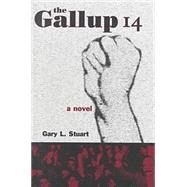Based on a notorious case of political coercion in the 1930s, when fear of Communism led to the scapegoating of foreigners and union activists, this novel uses court documents and newspaper reports to tell the story of the Gallup 14 through the eyes of lawyer Billy Wade and his schoolteacher girlfriend, Mary Ann Shaughnessy.
Mass arrests, lineups, and brutal political pressure from local authorities form the backdrop to this powerful story of racism, exploitation, labor politics, and the corrupt legal system that is charged with meting out justice.








